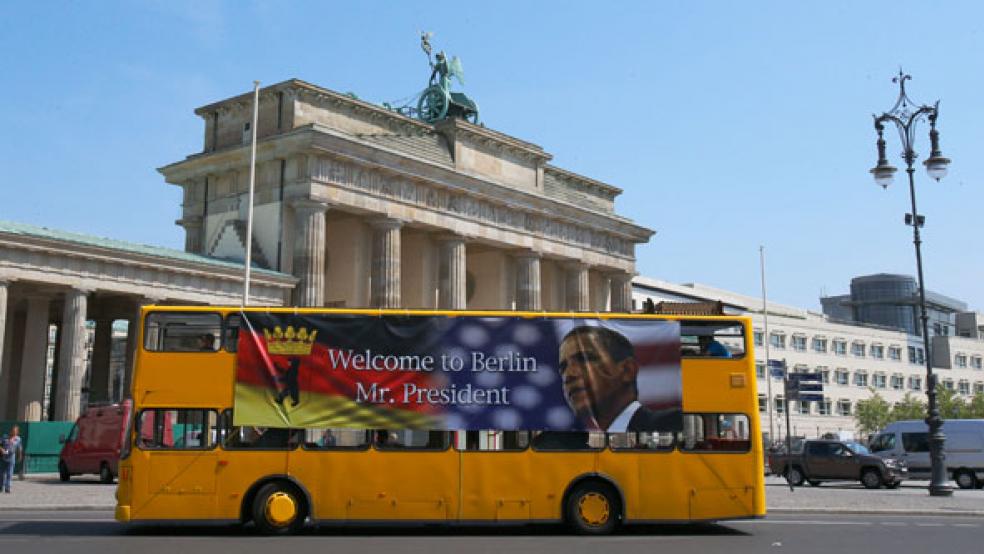Media trucks had already lined Berlin’s grand boulevard Unter den Linden Tuesday afternoon, fighting to set up shots of the podium in front of Brandenburg Gates where President Obama will speak today.

The president did little to temper expectations for his speech by choosing this location to address the Germans. He’s speaking at the same spot where President Kennedy gave the famous “Ich bin ein Berliner” speech 50 years ago, as the world was sinking deeper into the Cold War. It’s also where President Reagan in 1987 told former Soviet Premier Mikhail Gorbachev to “tear down this wall” as he pointed to the Berlin Wall.
Expectations for Obama’s speech are much, much lower. Kennedy and Reagan are still beloved in Germany – especially in Berlin – and when Obama spoke to some 100,000 people there in 2008, there were expectations he would reach the same status. Berliners, who had come to despise George W. Bush, cheered wildly and waved American flags as Obama spoke. Because of their history, Germans rarely wave Germans flags, let alone American ones.
After Obama was elected, Der Spiegel, the magazine that serves as the German political barometer, called him the “World President.” But the German disappointment with Obama has been evident in its pages since. The magazine said that he did not deserve to win the 2012 election, and recently ran a cover with Obama’s picture below Kennedy’s, calling Obama Germany’s “Lost Friend.” Protestors are selling t-shirts proclaiming Obama ist kein Berliner (Obama is not a Berliner) in advance of the speech.
RELATED: POST-AUSTERITY EUROPE GROPES FOR A GAME PLAN
"Most folks understand that Obama could not meet the super high and unrealistic expectations from his campaign in 2008," Joerg Wolf, editor of the Berlin-based open think tank atlantic-community.org, told The Fiscal Times. "There is, however, some disappointment because of the NSA revelations, Obama’s drone and climate change policies and Guantanamo, but primarily because it took him more than four years to finally come to Berlin as president. We crave attention and love from Uncle Sam."
Nowhere is the chasm between Obama and Germany more apparent than in his icy relationship with Chancellor Angela Merkel. The two have always held each other at arm’s length, and they have also traded barbs on Europe’s handling of the Eurozone crisis. By contrast, despite disagreeing on policy, George W. Bush had a warm relationship with Merkel, famously (and awkwardly) rubbing her back at a 2006 G8 meeting.
But for Germany’s sake, as well as the sake of the rest of the EU, Merkel needs this visit to go well. The two leaders are expected to discuss the developing bilateral trade deal that is expected to add $157 billion to the EU economy and $133 billion to the U.S. economy.
Europe needs that money more than the United States does. The U.S. economy is growing, while nearly all of Europe is stagnant. The fact that Obama traveled to Berlin as opposed to Brussels, the capital of the EU, shows just how important he thinks Germany is to the success of the trade pact.
The visit also is belaying concerns that the United States has forgotten Europe. Germans still like the president – 80 percent would have voted for him in the last election – but they don’t like his policies. According to Wolf, Berlin needs to be reassured of Obama’s affection for the city, but also needs to hear tough talk from the president on increasing its burden in Europe.
“Obama should not just celebrate the past and the vision of the [trade deal], but also clearly state that he expects Germany to increase defense spending, invest in much-needed military capabilities and contribute more to NATO,” Wolf said. “Europe has to take on security on its continent as the United States shifts its resources to Asia. Germany’s past cannot be used as an excuse any longer for lack of leadership.”


